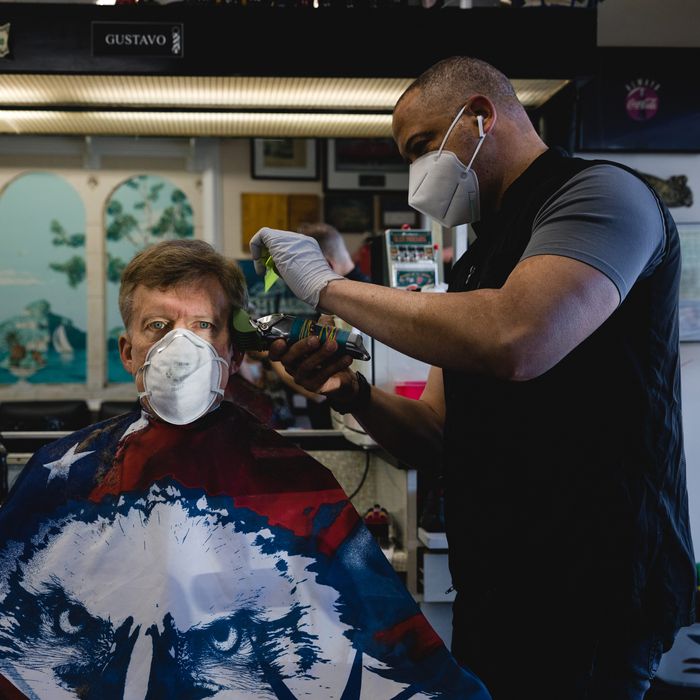
It’s been well-established for a while that African-Americans are being hit disproportionately hard by the coronavirus, for reasons ranging from poverty-related health conditions to poor access to health services to concentration in occupations most exposed to the virus. But the degree to which COVID-19 has victimized this demographic is dramatized by a new CDC study of hospitalized COVID-19 patients in Georgia, the state that is in the process of discarding restrictions on businesses and public gatherings via an order from Republican governor Brian Kemp. The Washington Post has the story:
Surveying eight Georgia hospitals, researchers found that in a sample of 305 covid-19 patients, 247 were black — more than 80 percent and more than they expected.
“It is important to continue ongoing efforts to understand the reasons for these racial disparities, including the role of socioeconomic and occupational factors in transmission,” the researchers wrote. “Public officials should consider racial differences among patients affected by COVID-19 when planning prevention activities.
It seems to be a little late for that in Georgia, a relatively hard-hit state, where Kemp nonetheless was among the last to impose a stay-in-place order and among the first to largely suspend it. Exposure at work in “essential” occupations has already had a disparate impact, as the Guardian explained recently:
Due to occupational segregation, black Americans have often been disproportionately represented in industries and occupations that face the greatest risks of known occupational hazards. The same seems to be the case with Covid-19 …
According to research from the Current Populations Survey, black workers were more likely to be employed in essential services than white workers, with 37.7% of black workers employed in these industries compared with 26.9% of white workers. This disparity is even clearer when you look at the healthcare industry. Black workers are about 50% more likely to work in the healthcare and social assistance industry and 40% more likely to work in hospitals, compared with white workers.
The businesses that choose to reopen under Kemp’s new order, forcing employees to give up unemployment benefits and go back to work in proximity to the public, are likely to have more black employees than businesses still operable via telecommuting. As Amanda Mull observes, it’s an experiment with human guinea pigs:
Georgia’s brash reopening puts much of the state’s working class in an impossible bind: risk death at work, or risk ruining yourself financially at home. In the grips of a pandemic, the approach is a morbid experiment in just how far states can push their people. Georgians are now the largely unwilling canaries in an invisible coal mine, sent to find out just how many individuals need to lose their job or their life for a state to work through a plague.
And once again, black people and other communities of color in Georgia will be among the most vulnerable:
“We’re opening up businesses that are not only high-touch and requiring proximity, but we’re also choosing industries where racial- and ethnic-minority communities are disproportionately represented,” [Georgia State University’s Harry] Heiman noted. He said that choosing to restart these industries is likely to deepen the crisis for communities of color in the South. “They’re going back to a job that places them at increased risk for exposure to coronavirus, and they don’t have access to Medicaid, because we haven’t expanded it,” he explained.
While Kemp talks a good game about the terrible financial burden on people who can’t work and on small business owners who can’t pay them, anyone familiar with the governor’s history has to figure it’s also a matter of ideology and appealing to his base. Kemp won his Republican primary in 2018 (with crucial late backing from Donald Trump) by campaigning as a “politically incorrect conservative” who delighted in offending his liberal critics. He fought Medicaid expansion tooth and nail, and championed Georgia as a haven for free enterprise. My colleague Zak Cheney-Rice recently observed that during his long tenure as Georgia’s election supervisor, Kemp grew accustomed to keeping minorities from voting rather than figuring out how to treat them as valued constituents:
One might be curious as to how Georgia wound up with a governor so incompetent and unworried by possible fallout. One answer: He spent eight years doing all he could to keep people who don’t like him from being able to vote, and once they didn’t or couldn’t vote for him, and he won election, his power became only marginally contingent on whether bad things happened to them.
According to exit polls, Kemp lost the African-American vote to Stacey Abrams by a 93/6 margin in the 2018 general election. He doesn’t have to be racist to devalue the interests of black Georgians in a pandemic, just amoral and cruelly pragmatic.
With African-Americans already greatly overrepresented in ICUs treating COVID-19 patients in Georgia, the numbers could continue to grow and the imbalance could get worse. Maybe Kemp’s gamble on what he considers an acceptable cost in death and misery will work out for him politically. But as I sit in self-isolation in one of the state’s recent COVID-19 hot spots and hear reports that all the sound health practices so recently adopted are already being abandoned, it’s hard to be optimistic about the pandemic, or about fairness and justice.
"to have an impact" - Google News
April 30, 2020 at 06:50PM
https://ift.tt/3d58ccn
Coronavirus Impact on Black Georgians May Get Worse Fast - New York Magazine
"to have an impact" - Google News
https://ift.tt/2OtZUAR
Shoes Man Tutorial
Pos News Update
Meme Update
Korean Entertainment News
Japan News Update
Bagikan Berita Ini















0 Response to "Coronavirus Impact on Black Georgians May Get Worse Fast - New York Magazine"
Post a Comment